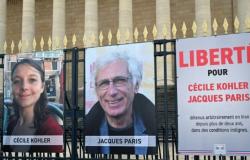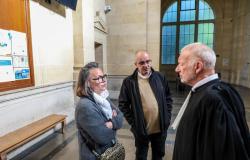Until now, the treatment of stomach cancer tumors, esophagus or rectum mostly involve radical interventions: organ removal, permanent colostomy, etc. Heavy acts, which are not without side effects. The daily The new York Times reports that a team of researchers from the Memorial Sloan-Telling Cancer Center (MSKCC), a New York center dedicated to research on the subject, may have found an alternative that could change the situation.
As part of a clinical trial, a monoclonal antibody, the Dostarlimab, was administered to 103 patients with tumors with DNA repair mutation. Forty-nine of them, suffering from rectum cancer, saw their tumor disappear completely, without reappearance after five years of follow-up. Among the fifty-four other patients, suffering from stomach, esophagus, liver, endometrium, urinary tract, etc., thirty-five have also experienced total regression of their tumor. Only five patients have seen the disease reappear, but four of them are today in remission after complementary treatment.
Subscribe for free to the Slate newsletter!The items are selected for you, depending on your interests, every day in your mailbox.
How does immunotherapy work?
If the treatment was so effective, it is because patient tumors had disasters in mesapparies. A particularity which prevents them from correctly repairing their DNA. “”Consequently, these tumors are dotted with unusual proteins which point out to the immune system to destroy them. But the tumors erect a shield that blocks attacks on the immune system. Immunotherapy pierces this shield and allows the immune system to eliminate tumors. ”, Details The New York Times.
-For the moment, access to this therapy is limited by its price: the cost of the drug amounts to $ 11,000 per dose (around 9,600 euros) and each patient must receive nine over a period of six months. The criteria for selecting patients are also extremely rigorous, the therapy being approved only for certain cancers such as those of the rectum or the uterus. Other patients will still have to wait for the expansion of official recommendations to benefit from it.
An alternative to surgery
Maureen Sideris, 71, discovered his cancer after feeling a simple difficulty in swallowing. Eligible for the clinical trial, it was able to avoid heavy surgery and aggressive treatments. Three months after his first infusion, his tumor had disappeared.
For Dr. Bert Vogelstein, oncologist at Johns-Hopkins University in Baltimore in Maryland, these results are “revolutionariesAnd could transform the care of certain cancers. “”Twenty or thirty years ago, the idea of being able to identify large tumors on many different organs and treat them without surgery would have appeared to be science fiction“He said.
The Dostarlimab only helps only a minority of patients, those whose tumor presents the famous mutation, which represents 2 to 3% of cases of cancer potentially concerned. Researchers are now hoping to expand these advances to other types of tumors and make immunotherapy accessible to a greater number.








